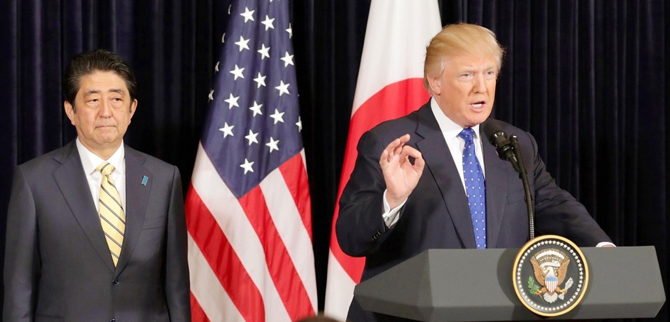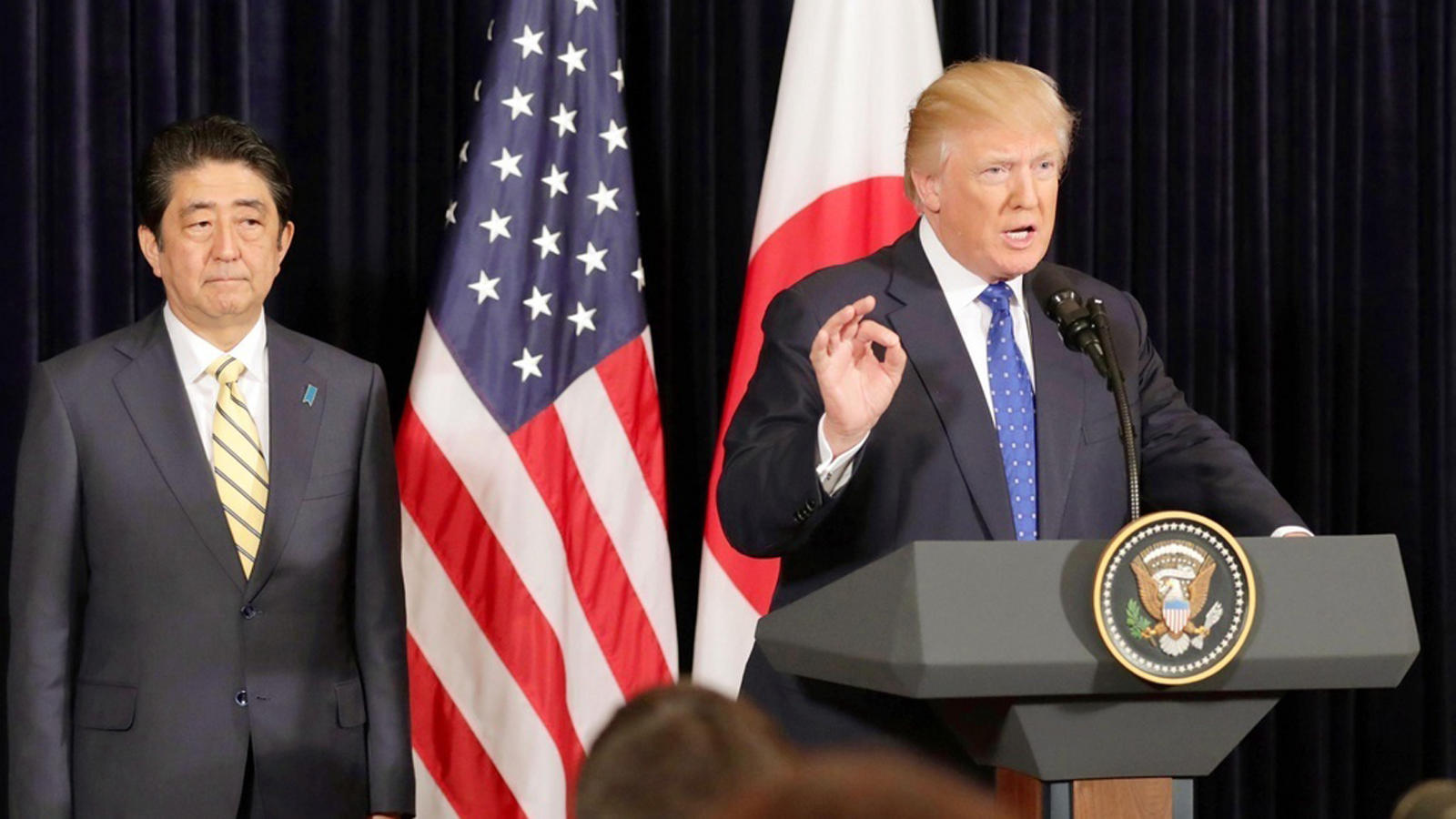
What became apparent in this survey is that while a certain number of Japanese and American people do express support for U.S. military action against North Korea, as seen in the 33 percent of Americans who support such action, they, nevertheless, see diplomacy as the best course and military action as a last resort. Furthermore, the American and Japanese people do not believe the situation on the Korean Peninsula will improve in the next few years. Such skepticism is found in the 40 percent of the American people who say North Korea should be allowed to possess nuclear weapons, and that Japan and South Korea should arm themselves with nuclear weapons. This view is contrary to what the Japanese people believe. Following are the results of the survey on the Japanese and American people's views on the North Korean crisis.
First, 62.9 percent of the Japanese and 59 percent of the Americans think U.S. President Donald Trump's handling of the North Korean situation "is not appropriate" (total of "not appropriate at all" and "not very appropriate").
The Americans appear to be more dissatisfied with Trump's approach to Pyongyang, with 41 percent responding "not at all appropriate," while 50.7 percent of the Japanese merely saying "not very appropriate." At the same time, 40 percent of the Americans and 35.9 percent of the Japanese find Trump's actions to be "appropriate" (including "could be seen as appropriate"), indicating that the people are very divided about the issue.
Opinion also split on military action by the United States
Meanwhile 48.3 percent of the Japanese and 44 percent of the Americans say they are against U.S. military action against North Korea, the response ranking first for both countries. But 33 percent of the Americans do favor U.S. military action, while 23 percent said they do not know. The positive response is equally mixed in Japan, with 20.6 percent of the Japanese in favor of military action and 30.8 percent saying they did not know.
Most effective measure should be diplomacy with military action as a last resort
Asked what would be the most effective way to halt North Korea's nuclear missile development, "continued multinational diplomatic efforts by surrounding nations like the six-way talks" ranked the highest, with 36 percent of the American people selecting this answer. This is followed by 22 percent who selected "China should take more assertive action." Only 11 percent chose U.S. military action as the best choice, indicating that Americans feel military action should only be used as a last resort.
Meanwhile, the Japanese express a more pessimistic outlook, with 27.2 percent selecting "do not think there is a way to halt North Korea's nuclear missile development." This is followed by 20.6 percent who say "direct dialogue between North Korea and the United States," 16.5 percent who say "China should take more assertive action" and 15.5 percent who say "continued multinational diplomatic efforts by surrounding nations like the six-way talks." The results indicate that nearly half of the Japanese respondents are also in favor of diplomatic measures to resolve the crisis. Only 8.4 percent of the Japanese say they believe U.S. military action is the most effective measure.
People of both nations don't expect early solution to the North Korean crisis
Asked whether the North Korean nuclear crisis can be resolved, 42 percent of the Americans say they do not know. This is followed by 33 percent who say "a resolution is difficult," meaning more than 70 percent of the Americans are pessimistic about the future of the North Korean situation. Merely 10 percent of them say the situation would likely see a resolution in a year or two, while 16 percent see a resolution in the next five years.
In Japan, 67.4 percent say "a resolution is likely difficult," and together with the 21.9 percent who say they do not know, nearly 90 percent of the Japanese are unconvinced that some solution will be found.
Furthermore, the respondents are pessimistic about the situation on the Korean Peninsula 10 years from now. Over 70 percent of the Japanese do not expect any improvement, with 46.7 percent responding "do not know" and 28.2 percent responding "this unstable situation will remain unchanged."
The top answer among the Americans is "instability and chain of violence due to war and North Korea's collapse" (45 percent), followed by "this unstable situation will remain unchanged" (32 percent). The results show that nearly half of the American people feel that even 10 years from now, it is unlikely that the situation will be more stable and that confusion on the Korean Peninsula will continue for a long time.
Over 30 percent of Americans in favor of Japan & South Korea's nuclear armament
The difficulty in resolving the North Korean crisis is creating a serious gap in views on national security between the Japanese and American people. Asked if North Korea should be acknowledged as a nuclear power, 70 percent of the Japanese say "should not be acknowledged." But in the United States, 38 percent say "should be acknowledged," while 37 percent say "should not be acknowledged" and 25 percent say "do not know."
Views on the nuclear armament of Japan and South Korea in the event North Korea refuses to halt its nuclear missile development program are also split between the United States and Japan. Only 12.3 percent of the Japanese are in favor of Japan arming itself with nuclear weapons, in contrast to 68.7 percent who are against it. The Japanese are equally against South Korea's nuclear armament, with only 9.3 percent in favor, while 68 percent are against it.
Meanwhile, 33 percent of the Americans are in favor of Japan possessing nuclear weapons, with the 40 percent against it. Furthermore, 26 percent of the Americans responded they do not know. There are also 33 percent of the Americans in favor of South Korea possessing nuclear weapons, with more than 40 percent against it and 26 percent saying they do not know.
Views on whether the United States should bring its nuclear weapons to Japan or South Korea in the event North Korea refuses to get rid of its nuclear arms are also divided. In Japan, 50.5 percent of the Japanese people are against the United States bringing in nuclear weapons, in contrast to the 21.1 percent who are in favor, and 27.7 percent saying they are unsure. The American people, meanwhile, voiced contrasting views, with 52 percent in favor, 21 percent against and 27 percent saying they did not know.
Only 20 percent of Americans feel North Korean crisis weakened U.S.-Japan ties
Asked what kind of impact the North Korean nuclear crisis is having on the U.S.-Japan relationship, the top response from both countries is "it has strengthened U.S.-Japan relations," with 45.8 percent of the Japanese and 41 percent of the Americans selecting this answer.
But 20 percent of the Americans feel the situation has weakened the relationship. Pyongyang's development of intercontinental ballistic missiles that can reach the U.S. mainland, and the lack of any feasible resolution to the North Korean situation have made many Americans look inward and prioritize domestic issues, casting a shadow over U.S.-Japan relations.
However, there are 49 percent of the Americans who believe the United States should maintain its current military strength in Asia in the future. Together with the 29 percent who believe "the United States should further strengthen its military force," nearly 80 percent of the American respondents support the U.S. military presence in Asia at current or increased levels for the region's security.
In Japan, 41.8 percent feel "the United States should maintain the current level of its military presence," but 32.6 percent say they do not know, indicating that many Japanese are unable to determine the future security environment of Asia as well as the necessity of the U.S. military presence in the region.
North Korea's nuclear development is to protect Kim regime and its authority
Asked why North Korea continues its nuclear development program, the top answer from people of both countries is "in order for North Korea to maintain its political regime and authority." Some 46 percent of the American respondents and 35.2 percent of the Japanese selected this response. This response is followed by "mainly for North Korea's ambition and aggression," selected by 25 percent of the Americans. Among Japanese respondents, 23.8 percent also selected this answer, but the second-largest response is "because North Korea wants to be acknowledged as a legitimate state and wants to obtain legitimate rights as a member of the international community," with 24.8 percent. Only 12 percent of the Americans selected this answer.
Last, the respondents were asked what nations should be involved should there be a multinational dialogue mechanism that would serve to realize stability in the Northeast Asian region. The largest response is a five-nation framework consisting of Japan, China, the United States, South Korea and Russia, with 35 percent of the Americans and 35.9 percent of the Japanese selecting this response. The second-largest response among the Americans is a four-nation framework of Japan, China, the United States and South Korea (26 percent), while the second-largest response among the Japanese is "do not know" (29.6 percent). The third-largest response for Japanese respondents is a three-nation framework of Japan, China and the United States (11.7 percent), but this choice is selected by only 5 percent of the Americans.

Post a comment